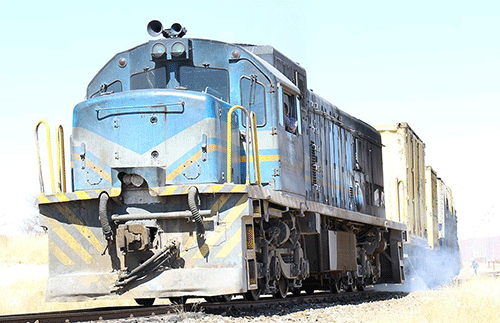TransNamib will soon operate the first dual-fuel locomotive in Africa. If all goes according to plan, two locomotives being converted locally and in South Africa will utilise a combination of green hydrogen to be produced in Namibia and diesel fuel.
The beleaguered national rail operator yesterday confirmed it is awaiting funding confirmation from the Southern African Science Service Centre for Climate Change and Adaptive Land Management (SASSCAL). The centre is to confirm the project disbursement schedule in writing after TransNamib was successful as one of four applicants for pilot projects announced last year at the value of 7.63 million euros (some N$155 million). The project consortium consists of Hyphen Technical, CMB.TECH, TransNamib and other partners, who have committed to driving the development, testing and operation of the state-of-the-art locomotive technology. The project consists of two hydrogen-converted locomotives and one accompanying hydrogen fuel tender wagon and accessories.
“Two locomotives will be converted – one in South Africa and one in Namibia – in the TransNamib workshop. The planning and project programme is ready for implementation. The execution will be implemented upon the confirmation of funding. TransNamib is confident in its ability to deliver this project,” stated TransNamib spokesperson Abigail Raubenheimer.
SASSCAL is a joint initiative, which comprises Angola, Botswana, Namibia, South Africa, Zambia and Germany, in response to the challenges of global change. The initiative conducts research in adaptation to climate change and sustainable land management.
Responding to questions from New Era, Raubenheimer assured that coupled with strategic partners, there is currently nothing that will delay the finalisation of the project once the grant funding required has been released. She noted the company is thrilled with the potential benefits the project holds, as it provides a key for TransNamib to decarbonise its operations.
“Given that the carbon footprint of rail is already much less than road transport, this could further boost our competitive advantage in moving freight in Namibia in a manner that has less impact on the environment. Furthermore, it could potentially provide us with a strategic advantage to provide this essential technology to the African continent from a local platform,” she explained.
Raubenheimer added that the pilot and research projects are expected to take 24 months to complete. The dual fuel locomotive project is one of the initiatives the rail operator has undertaken to lift itself out of the financial doldrums, not having made any profit since its inception. During the 2010-2017 period, the company incurred accumulated losses amounting to over N$4 billion.
Meanwhile, the spokesperson reiterated the company’s dire need for investment to boost revenue generation capacity.
Until the company is able to access substantial funding, Raubenheimer noted, its trajectory will remain as is.


